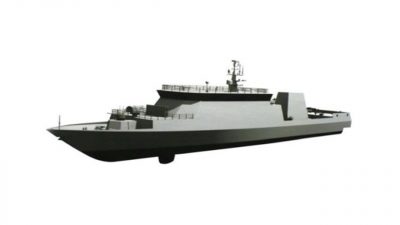Anti-Submarine Warfare Shallow Water Crafts 02/05/2019 – Posted in: Daily News
Anti-Submarine Warfare Shallow Water Crafts (ASWSWCs)
For: Preliminary
Topics covered: ASWSWCs – features, Marine Pollution, IMO, GRSE
News Flash
The Ministry of Defence (MoD) signed a contract with Kolkata based defence shipyard Garden Reach Shipbuilders & Engineers Limited (GRSE) for the construction of eight Anti-Submarine Warfare Shallow Water Crafts (ASWSWCs).
GRSE is currently handling major projects including building 3 stealth frigates for Indian Navy under P17A project, ASW Corvettes for Indian Navy, LCUs for Indian Navy, 4 survey vessels (large) for Indian Navy, FPVs for Indian Coast Guard etc.
Features
- These ships, displacing 750 tonnes, have a complement of 57 personnel and can reach speed of 25 knots.
- They are capable of full-scale sub-surface surveillance of coastal waters and coordinated ASW operations with aircraft.
- These can also be deployed for search and rescue by day and night in coastal areas.
- In their secondary role, these will be capable to prosecute intruding aircraft, and lay mines in the sea bed, the statement added.
- The vessels are equipped with advanced state-of-the-art integrated platform management systems (IPMS) including Propulsion Machinery (machineries that provides the power to drive the propeller of the ship), Auxiliary Machinery, Power Generation (includes pumps, compressors, and blowers for circulating fuel and fresh water) and Distribution Machinery and Damage Control Machinery, etc.
The warships will conform to latest MARPOL (Marine Pollution) Standards of the International Maritime Organization and Safety of Life at Sea.
The International Convention for the Prevention of Pollution from Ships (MARPOL)
MARPOL is short for maritime pollution. MARPOL is the main international convention covering prevention of pollution of the marine environment by ships from operational or accidental causes. The MARPOL Convention was adopted on 2 November 1973 at International Maritime Organization (IMO). The Protocol of 1978 was adopted in response to a spate of tanker accidents in 1976-1977. As the 1973 MARPOL Convention had not yet entered into force, the 1978 MARPOL Protocol absorbed the parent Convention.
The Convention includes regulations aimed at preventing and minimizing pollution from ships – both accidental pollution and that from routine operations – and currently includes six technical Annexes.
- Annex I Regulations for the Prevention of Pollution by Oil (entered into force 2 October 1983)
- Annex II Regulations for the Control of Pollution by Noxious Liquid Substances in Bulk (entered into force 2 October 1983)
- Annex III Prevention of Pollution by Harmful Substances Carried by Sea in Packaged Form (entered into force 1 July 1992)
- Annex IV Prevention of Pollution by Sewage from Ships (entered into force 27 September 2003)
- Annex V Prevention of Pollution by Garbage from Ships (entered into force 31 December 1988)
- Annex VI Prevention of Air Pollution from Ships (entered into force 19 May 2005)
International Maritime Organization
IMO is the United Nations specialized agency with responsibility for the safety and security of shipping and the prevention of marine and atmospheric pollution by ships. IMO’s work supports the UN SDGs.
Its main role is to create a regulatory framework for the shipping industry that is fair and effective, universally adopted and universally implemented.
GRSE
It is India’s pioneer warship builder since its inception as a Defence Public Sector Undertaking (DPSU) in 1960. It has delivered highest number of warships till date.
Source: Economic Times
You can follow us on LinkedIn and for more updates related to UPSC IAS Preparation, Like our Facebook Page and subscribe our Diligent IAS Youtube Channel
Also Read Related Daily News

